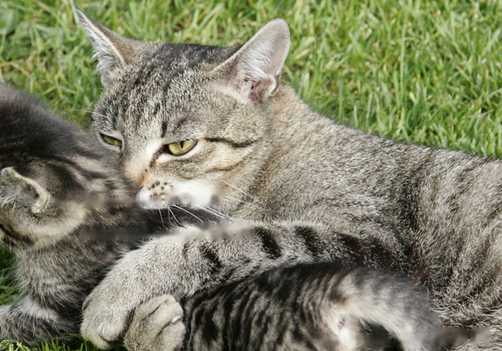We should pay special attention to the newly born kittens. The infant stage is one of the important growth stages of cats. We must learn to take care of kittens to make them grow up healthily. Especially in the diet, it is necessary to cultivate good habits for cats, and they must not be picky eaters. They must have a balanced diet. So, what should be paid attention to in the daily diet of kittens?
1. Understanding of kitten's growth cycle
1. Cat's growth L stage
(1) Vision. Eyes open: 8 to 20 days. Eyes become fixed color: 12?L.
(2) athletic ability. Climbing: 16 to 20 days. Walking: 21 to 25 days. Running: 4 to 5?L.
(3) Weaning. Start solid food: 3 to 4?L. Complete weaning: 8?L.
(4) Training. Begin training for bowel movements: 3 to 4?L.
(5) Long teeth. The deciduous teeth are evenly long: 8?L. Tooth extraction: 12~18L.
(6) Learning skills. Face wash and grooming: 4~5?L. Start frolic: 4 to 5?L. Start practicing hunting: 6 to 8?L.
(7) Registration. Purebred Cat Registration: Section 5?L.
(8) Vaccination and surgery to remove sex organs. First vaccination: 9th L. Second vaccination: 12?L. Ovariectomy in female cats: 16?L. Castration of male cats: Section 36?L.
(9) Live independently without the female cat. Earliest time to leave the female cat: 6 to 8?L. Time to live independently without the female cat: 6 months.
2. Can't see or hear
When kittens are born, they are generally 11 to 15 cm in length and 70 to 135 grams in weight. Newborn kittens have not yet opened their eyes and their ears are folded back, so they can neither see nor hear.
3. Depends on the female cat for survival
She can't walk at birth and completely depends on the female cat for survival. It took eight weeks to live independently. The first development in kittens is when their eyes begin to open at five to ten days.
4. Changes in eye color
It takes eight to twenty days for the eyes to fully open. Eye color is usually gray-blue, and this early color changes at about twelve ?L. Kittens start crawling at 16 to 20 days old and start eating solid food at 3 to 4 weeks old.

2. Kitten feeding and attention
1. Balanced nutritional ratio
The gastrointestinal system of the newborn kitten is suitable for digesting and absorbing milk, and gradually the kitten's stomach and intestines begin to develop intolerance to lactose. A balanced diet of nutrients is very important for the growth and development of cats.
2. Distinguish four kinds of tastes
The smell of food determines the palatability of food. From the 10th day, kittens can distinguish four kinds of tastes: sour, bitter, sweet y and sweet. However, kittens are not very sensitive to sweetness, and they generally do not like sweetness.
3. The quality is easy to control
Although the quality of the self-made food is easy to control, it is difficult to ensure a comprehensive and balanced nutrition, and it cannot guarantee that it can provide the necessary food for the growth and development of the kitten. nutrients, such as minerals and vitamins.
4. High cost and difficult to preserve
Self-cooked food, such as meat, rice, vegetables, etc. The food that the owner wants to make with precise nutrition is often much more expensive than the manufactured food on the market, and it is difficult to preserve, which is time-consuming and labor-intensive.
5. Not only provide meat
Although cats are meat eaters, in the wild they not only eat the muscles and livers of their prey, but also swallow bones and internal organs. The prey is often herbivorous or omnivorous, so the cat will eat some fruits and vegetables from time to time.
More and more friends will choose to keep pets, and cats are well-behaved and welcomed by many friends. Many friends will buy newborn kittens to raise, but since the kittens' physical development is not yet complete, extra care and attention should be paid to their care. Pay special attention to the diet, you can choose a special cat food, you can let it eat more fruits and vegetables.
![[Dog Training 5] The training method of pet dog dining etiquette](/static/img/12192/12192_1.jpg)




